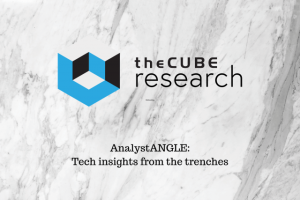The following is a working list from theCUBE Research on potential topics we’ll cover around data platforms in 2024. We welcome community input to these themes and will iterate throughout the year as warranted.
1. Customer Spending Patterns in Data Platforms
- Spending momentum and market presence in data, analytics, ML/AI.
- Customer perceptions on data and analytic priorities.
- Data challenges with generative AI
- Competitive positioning of leading and emerging data platforms
- Ecosystem momentum
2. Building Intelligent Apps with Data
- Customer strategies for combining transaction and analytic data.
- Historical systems of truth leveraging data to make decisions and take action.
- Data as the new “development kit.”
- Using generative AI to develop applications that represent a digital version of an organization.
- Architectures to enable facile data access to multiple data types
3. Beyond Data Warehousing: Next-Generation Architectures and the Sixth Data Platform
- Investigate architectures that transcend traditional and cloud data warehousing, focusing on facile data integration, incorporating multiple data types and query options with governance and security.
- Explore the evolution of data lakes, lakehouses, and mesh models as foundations for supporting diverse analytical and operational workloads.
- Separating compute from data in open formats.
- Enabling digital representations of organizations, tying together people, places and things across an ecosystem of employees, customers, suppliers and partners.
4. Real-Time Data Processing and Analytics
- Examine the technologies and methodologies enabling real-time data streaming, ingestion, and analysis, emphasizing low-latency and high-throughput systems.
- Assess the impact of emerging standards and protocols on real-time data interchange between platforms and applications.
5. Technological Advances in Distributed Computing: Scalable Joins and Computations
- Dive into the latest distributed computing frameworks capable of performing massive, efficient joins and computations across geographically dispersed datasets.
- Analyze case studies of successful implementations, focusing on the technical challenges and solutions in distributed data processing at scale.
6. Governance, Compliance, and Security in the Data Ecosystem
- Develop comprehensive frameworks for data governance that ensure data quality, lineage, and compliance with global regulations.
- Explore cutting-edge security models and encryption technologies that provide robust protection for data at rest and in transit, addressing both internal and external threats.
7. Hybrid Data Models: Integrating Structured and Unstructured Data
- Investigate the design and implementation of hybrid data models that accommodate structured, semi-structured, and unstructured data, facilitating complex analyses.
- Evaluate the role of NoSQL databases, graph databases, and time-series databases in supporting varied data types and structures.
8. The Role of Generative AI in Shaping Customer Data Strategies
- Assess the implications of generative AI technologies on data collection, processing, and insight generation, with a focus on enhancing customer experiences.
- Explore ethical considerations, privacy concerns, and the potential for bias, ensuring that AI-driven data strategies prioritize customer trust and transparency.
9. Privacy-Enhancing Technologies for Data Security
- Delve into the development and application of privacy-enhancing technologies (PETs), such as differential privacy and secure multi-party computation, in safeguarding user data.
- Examine the balance between data utility and privacy, evaluating how PETs can enable data analysis without compromising individual privacy.
10. Interoperability and Standardization Across Data Platforms
- Open data formats and customer preferences.
- Cost optimization for data engineering and pipeline activities.
- Address the challenges and strategies for achieving interoperability among diverse data platforms, focusing on standardization efforts and open-source initiatives.
- Analyze the role of APIs, data formats, and protocols in facilitating seamless data exchange and integration across ecosystems.
Image: Dmitry

